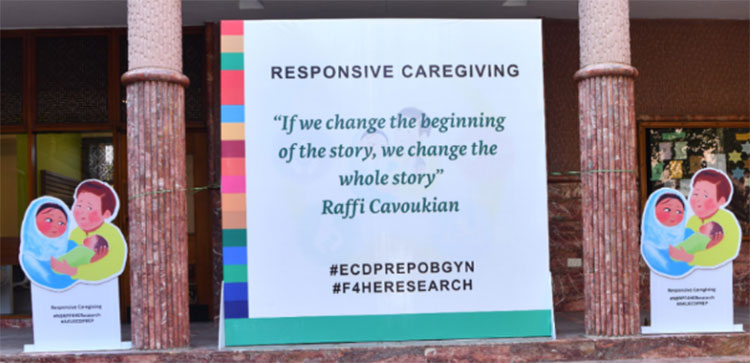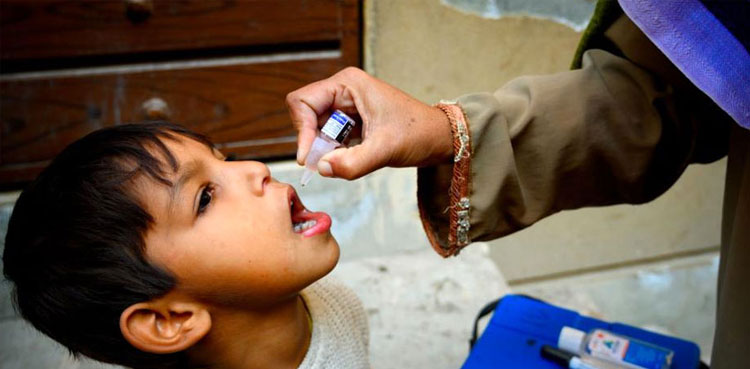
Caregiving Initiatives for thriving Early Childhood Development.
”
The earliest years of life are the most crucial stage of human life span development as it lays the foundation for a child’s overall well-being and development and set the trajectory for life.
There is a significant lack of importance of secure attachment, stimulation, and responsive interaction that fosters healthy brain development, emotional resilience, and future learning outcomes in our societies. Parents, Children, Educators, Healthcare Providers, Civil Society Organization Representatives, Policy Makers, Early Childhood Development ECD Experts, and Key Stakeholders from various fields were invited to an advocacy conference arranged by the (ECD), Parenting Readiness Education Program (PREP), Department of ObGyn, Aga Khan University to contribute to a discussion that emphasizes the role of Responsive Caregiving in ECD.
The conference was held for four days from 12th-15th February 2025 including a pre-conference webinars, round table, and main advocacy event that emphasized driving meaningful change in early childhood program and elevating the role of responsive caregiving and scaling parenting education in different settings. This Conference was a part of Foundations for Health and Empowerment (F4HE) research support. The advocacy event started with webinars emphasizing the need for responsive caregiving in different areas of children’s development.
The first webinar was focused on building foundational skills for young children, to which representatives Sam Wilson and Dr Zainab Salim from Pakistan Foundation Learning Hub shared, “Foundation learning is more than academics that fosters critical thinking, resilience, and problem-solving skills in young children. In Pakistan integrating ECD into education is crucial for bridging learning gaps”. Later, the discussion continued with the second pre-conference webinar that signified the role of nurturing care in the ECD, one of the experts Dr Rajesh Mehta, a former WHO representative shared, “Nurturing Care Framework is a road that emphasizes the critical importance from particularly from pregnancy to age three, shaping a child’s future”. The conversations continued to share the gaps we have in the system to support the workforce in ECD and a dire need to invest in their accreditation, recognition, and uptake, on which faculty from Nottingham Trent University, UK Dr. Aaron Bradbury and Dr. Philippa Thompson shared, “ A formalized Early Childhood Education and Development (ECED) career pathways through structured training, accreditation, and professional recognition should be implemented to ensure a skilled workforce”.
Considering the times today, it is not wise to exclude the role of technology in advancing responsive caregiving in the early years wherein one of the webinar experts from Canada, Zen Tharani shared, “For a parent or caregivers it is imperative to understand current trends of technology and artificial intelligence (AI) rather than distancing themselves from it. Recognizing its impact on children’s development, caregivers must get themselves aware of the recent advancements”
Early childhood development (ECD) in Pakistan, while recently gaining attention, still hasn’t become a central focus—particularly when it comes to parenting education and engagement in ECD. There is a growing need for structured programs that equip parents with the knowledge and skills to support their children’s early development. Strengthening multi-sectoral collaboration can help integrate parenting education into existing health and education systems for greater impact. To ensure, there are actionable strategies to support this, a consultative round table was also held on February 14, 2025. Stakeholders, parents, and children from different entities of Aga Khan University (AKU) and organizations like Aga Khan Foundation (AKF), Aga Khan Education Services (AKES), Aga Khan Health Services (AKHS), Aga Khan Rural Support Program (AKRSP), UNICEF, Government of Sindh (GoS), IECED, Idara-e-Taleem-O-Agahi (ITA), Charter for Compassion (CfC), Beaconhouse School Systems (BSS), Rupani Foundation (RF), MAJU, Oxford University Press (OUP), Kiran Foundation, and Teachers Resource Center (TRC) participated in this high-level discourse. To this Dr Farid Panjwani, Dean IED, AKU, shared that “Raising children in times to come will not only require parental skills but demand support to be provided to the caregivers by tailoring our policies and systems in a way that parents have time to love, play, and be present with their children”. The participants came up with a collaborative position statement on how parenting education and responsive caregiving initiatives can be implemented and scaled at the systems and policies level, in healthcare and education settings, and in community settings.
The main conference program, held on February 15, 2025, brought together experts and participants from various fields, including philanthropy, academia, healthcare, and early childhood development (ECD). The conference featured discussions on crucial topics, including newborn-responsive caregiving, scaling ECD initiatives, parenting across diverse settings, and nurturing care. The conference began with an opening talk shedding light on the importance of ECD. Later followed by keynotes from Dr. Monica Oxford from the University of Washington, Dr. Aisha Yousafzai from the Harvard University, and insights from Dr Antje Von Suchodoletz from the New York University Abu Dhabi. Philanthropist Amin Hashwani, who was the chief guest emphasized investing in ECD by stating “You can count the seeds in one apple, but you cannot count the apples in one seed”just as the impact of early childhood development may begin small, its growth and lifelong influence are immeasurable. He also emphasized the need to strengthen the institutional capacity to envision, deliver, and scale ECD”. Dr. Tara Uzra Dawood, in her special guest talk, emphasized the importance of economic empowerment for parents, particularly mothers, stating that enabling them to meet their financial needs would contribute to creating a nurturing environment for their children.
Following the key theme of responsive caregiving, another ECD expert facilitator Dr. Saba Shuja stated, “A good foundation starts right from conception, and makes a difference throughout a person’s life, and gives the next generation a better start”. The conference also had expert panels on the integration of responsive parenting in the healthcare sector and why the nurturing care framework is vital for ECD. The experts included Dr Anum Aziz, Sara Sheikh and Samira Lakhani from AKU, Dr Ghulamudin Delawar and Sanober Nadeem from AKHS, Dr Shaista Siddiqi from CfC, Dr Naveed Bhutto from GoS, Neda Mulji from OUP, Baela Raza Jamil from ITA, Dr Faisal Ismail from AKU and Syeda Saima Mazhar from AKESP.
Overall, the conference provided valuable insights into the current landscape of early childhood development and reinforced the urgency of investing in young children’s early years such as workforce development and integrating parenting education programs into the existing healthcare model. The discussions underscored the need for continued advocacy, cross-sectoral collaboration, and evidence-based policymaking to ensure that every child receives the best start in life. The conference yielded multisectoral engagement and commitment to scale responsive caregiving in different settings with the following key takeaways:
- Provision of all components of nurturing care framework and foundational learning skills are essential in the earliest years of life and collaboratively everyone needs to ensure its provision to young children and their families.
- Technology should not come as a fear but as an opportunity to scale early childhood development and enhance parental skills
- State must initiate ECD care provider accreditation and licensing
- Family-friendly policies should be made publicly available, and the state must ensure their implementation in all sectors
- Multisectoral collaborations are one of the most constructive strategies to scale parenting education and engagement in Pakistan whereby healthcare, nutrition, education, social protection, academia, corporate social responsibility sector, civic society organizations, and public agencies must come together to collaboratively implement and scale such initiatives.
- Capacity development programs are required for the care providers to support parents and responsive caregiving for young children e.g. inclusion of elective courses on parenting and scaling parenting in different settings for teachers, educators, healthcare professionals, and leaders in the field.
- Climate and environmental stewardship are fundamental in all ECD interventions. Children and their caregivers are most vulnerable to climate and socioeconomic crisis which impacts them directly.
- Institutional strengthening is essential to empower caregivers to raise a thriving generation
Parenting is not just a responsibility of a family or primary caregivers, but it is a collaborative effort. Parents and caregivers require support to offer responsive caregiving and as it is mentioned in a famous quote “It takes a community to raise a child” hence let us all take a pledge to support, empower, and build the capacity of the parents and caregivers so that they can raise healthy, happy, and resilient children for our future.
Dr. Shelina Bhamani is a faculty member and leads ECD PREP at Aga Khan University. Misbah Shams and Sehrish Choudhry are part of the same team. The views expressed are personal, and this report does not represent any institutional endorsements.
”


